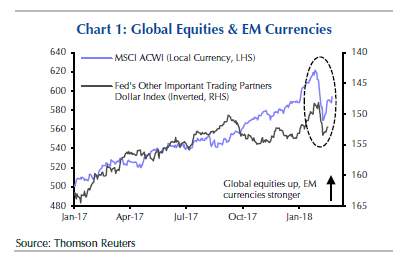As talk of tariffs roiled global markets, with Asian and European markets particularly hard hit, it is interesting to note the relative rebound in the S&P 500. Who will be the winners and losers from Trump’s trade talks? While the trade riff had its impact, what happens on Monday could in large part shift market performance drivers from trade to political concerns, depending on election results. And then there are global macro trends, some of which Capital Economics saw coming on February 26 well before the trade issues surfaced.

Who will be the winners and losers in a trade war? At this point, it is challenging as US markets ended sharply higher, while Asian and European markets were losers. The news had little impact in many emerging markets.
The S&P 500 average reversed course Friday, closing higher by nearly 14 points, up 0.51%. The VIX volatility index was down 1.26, or 5.61%, outstripping its correlation range ratio, while the NASDAQ was up 33 points, and the Dow Jones Industrial Average was down near 150 points, or 0.58%.
The mixed US markets came as Europe and Asian markets were hammered. In Asia, the Japanese Nikkei 225 ended down 542.83, off 2.5%, the most significant drop in the region. The Hong Kong Hang Seng was lower by 460.80 points, down 1.48% while the Shanghai SE Composite Index should be the least about of concern, down 19.23 points, off 0.59% on the day. The most significant losers in Europe were the French CAC 40, down 125.98 points, off 2.39%, while the German DAX was down 2.27% on the day.
But outside of the developed world, others are finding opportunity. The trade wars come at a unique time for emerging market assets.
The short-term trend had been higher. Emerging market currencies and stocks had been benefiting from increased demand for risky assets, Capital Economics editor John Higgins observed. But in a report aptly titled “Rebound in EM currencies not likely to be sustained,” he also pointed to a potential trend change.
Investors often retreat from emerging market assets when there is concern about growth in developed economies. During the global financial crisis as well as the Eurozone crisis when stocks sold off in what “reflected both fears about the knock-on effects for EM growth and withdrawal from risky assets more generally,” Higgins noted.
But how do emerging market assets behave when there might be winners and losers among the developed world? On the day the Brazilin Bovespa was off by 0.25% while Mexican stocks were lower by a modest 0.8%.
The muted moves in emerging markets come as stronger than anticipated wage data was released last week, sparking inflation fears. Inflation, particularly commodity inflation, can benefit specific resource-rich emerging markets.
The demand for emerging markets assets has varied performance drivers, with political stability, natural resource wealth and an educated populace among them. How will these currencies be impacted? “Although the rally in emerging market (EM) currencies against the dollar has resumed recently, we doubt that it will last,” Higgins wrote. “Indeed, we expect the currencies of several of the largest EMs to weaken in the next couple of years as investors lose their appetite for risk.”
While Higgins was looking at the larger picture, the US dollar / Brazilian Real spot rate was down slightly, -0.4%, but the Canadian dollar wasn’t much changed despite all the negative trade talk.
Other variables could influence markets. Sunday investors will eye Italy as elections could result in a meaningful win for the populist Red Star Movement. In Germany, the Merkel government could, likewise, be challenged if a political accord isn’t reached with the SPD coalition.
What does it all mean? On Monday trade fears could transform into European Union political fears quickly if elections turn negative for the global economy.

